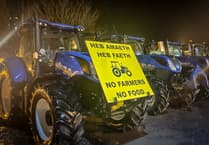Mark Drakeford doesn’t normally get bolshy.
All right, there was that gloriously ferocious moment in October when he let rip at the time-serving Welsh Tory leader, Andrew R T Davies, for getting moralistic over the NHS. An eruption that will have garnered much applause in the outside world.
But, usually, he relies for guidance on calm rationality, combined with a preference for the status quo and, specifically, a strong disinclination to rock the UK boat.
The trouble with Drakeford’s all quiet on the western front approach is that, for one thing, it leaves Wales ill-equipped to repulse the UK government’s sleight of hand over levelling-up cash.
In the latest allocations, Wales got a total of £208 million for 11 projects. Ceredigion, one of the poorest places in Europe, got nothing; neither did 10 other local authority areas in Wales. If we’d still been in the EU, Wales as a whole would have raked in about £1.1 billion more.
Yet confronted by this flagrantly unfair level of funding, the first minister responded with a rebuke which will have made as much impression on Rishi Sunak’s government as a tennis ball chucked at a battle-tank.
It’s worth quoting his Twitter post in full: “Despite repeated promises, the UK government’s announcement today leaves Wales with less say over less money.
“We’ll lose over £1 billion that could have been used to grow the economy and support our most disadvantaged communities. This is not levelling up, it’s levelling down.”
He might as well have said: “Oh, go on, just walk all over me.”
But there’s more to this story. Wales is not only being short-changed but is being granted no more than token involvement in levelling-up funding decisions, there having been no meaningful consultation in how money should be spent in areas of devolved responsibility. Instead, too often, the Treasury is deciding how funds are allocated and is distributing them directly without specific engagement with the Welsh government.
This represents a clear determination by the UK government to hang onto powers and responsibilities that, following devolution, should have been handed to Wales. Clearly, it’s very important, if devolutionary democracy is not to be weakened, that the Welsh and other devolved governments are at the centre of decisions on the entirety of levelling-up policy and funding.
Actually securing such involvement will demand a distinct hardening of Drakeford’s approach, an end to his customary mild agreeableness. He can do it - Andrew Davies will confirm that.
Loxdale dishes out typical Tory tripe that’s short on real food for thought...
Patrick Loxdale writes with the disbenefit of a politically-biased filter.
In his launch Right Field piece in last week’s Cambrian News he rattles on about the small percentage voter turnouts which determined major political change in Wales - the devolution vote (50 per cent) and the 2011 Assembly extra-powers referendum (36 per cent).
He claims to put forward his thoughts as an individual untainted by the fact of his chairmanship of Ceredigion Conservative Association.
Does he expect therefore not to be challenged on the omission from his tale of woe the disgracefully unrepresentative election last year of Liz Truss on the strength of the votes of a tiny coterie of Tory voters who were required only to be members of the Conservative Party?
Just a reminder: those party members made up fewer than one per cent of the UK electorate.
... and half-cocked facts on woodcocks
The Beretta’s ready, a game-bag’s over your shoulder, the dog’s raring to go. You’re off to the woods in pursuit of a woodcock or two…or however many get in the way of your shotgun pellets.
Culinary options have been considered: roast, pan-seared or, a bit exotic this, creole-style with rice. Now, the only thing to remember before you squeeze the trigger is the importance of being sure about where the birds in question come from. Because only Russian woodcock should be blasted from the skies. Scandinavian ones at a pinch.
Welsh ones never.
That’s if you’re going to follow the advice of Owen Williams, of Trefenter, who says he feeds birds in his garden - and shoots woodcock “for the table.”
As he makes clear in a letter to the Cambrian News, this is in the context of defending himself and other people who shoot birds from the suggestion in an earlier letter that they are “psychologically inadequate”.
He can’t understand why anyone would say that. What’s so odd about killing beautiful creatures you’re fond of? The clue seems to be in the fact that, according to Owen, more than 95 per cent of woodcock shot in Wales and south-west England are from abroad. They’re foreigners who just want to spend the winter here. That’s surely reassuring. I mean, these woodcock from the north must by now know the risks, so if they keep on coming over here when it gets a bit too chilly at home they’ve only themselves to blame if they go and get themselves blasted from the skies.
Also, Owen claims, alien woodcock arrive in “huge numbers”, meaning there are no worries about population strength. So, clear consciences all round. As George Orwell might have said: all woodcock are equal, but some are more equal than others. All are wonderful, but foreign ones are expendable because numerous, while those hatched in Wales are few and therefore sacrosanct. Makes perfect sense.
Regrettably, and I hesitate to mention this, Owen doesn’t tell us how many Welsh birds make up the 5 per cent who live here all year round and are killed. It could be hundreds, which would be very serious given that these bulky waders have been on the UK and Ireland red lists of Birds of Conservation Concern for the last eight years because of a long-term decline in their breeding population. He doesn’t mention the red lists either, but then you can’t squeeze everything into a letter to the editor.
I have to say, though, that he still needs to explain how, at 20 yards and in dim light, he can tell the difference between Welsh woodcock and their friends from the north. Are the Russkies’ heads snug with thicker feathers in the shape of a Nikita Khrushchev fur hat? Is their call delivered with a Muscovite twang? Or are they simply a bird that would quite like to spend a quiet winter here unmolested, and wing it back to Russia in the spring?
There is, though, something else: my attention has been drawn to concerns that the woodcock debate may be masking a threat to Britain’s security.
Owen refers to ringing and electronic tagging, which he also does. The worry is that specially tagged and trained Russian woodcock are being programmed by the Kremlin to fly to GCHQ, the security and cyber agency at Cheltenham, there to engage in covert intelligence-gathering through miniature cameras and listening devices clipped to their legs. Later, some of these wily spies, presumably fancying a bit of overwintering to the west, are defying orders and cruising across to the woodcock-killing fields of Wales. To be on the safe side, Owen and his friends should be asked to parcel up any Russian-tagged birds they bring down and send them to MI6.



